A Study to Analyze Social Media Marketing Effectiveness in UK Airlines
VerifiedAdded on 2022/11/17
|51
|14055
|1
Report
AI Summary
This report analyzes the effectiveness of social media marketing compared to traditional marketing strategies within the UK airline industry. The study, structured into five chapters, explores the background of the industry, the problem statement concerning effective social media advertisement and employee technological aptitude, and the research aim to analyze social media's effectiveness. The literature review examines social media and traditional marketing, while the methodology chapter details the research approach, design, and data analysis. Findings and discussions critically analyze secondary data, linking them to the literature review. The conclusion summarizes key findings, links them to objectives, and provides recommendations for improved social media marketing strategies, such as creating user-based advertisements, employing social media professionals, and offering advanced service information. The report aims to identify factors favoring social media marketing, differences between the two marketing methods, and how social media enhances market exposure and brand image, ultimately recommending strategies for success.
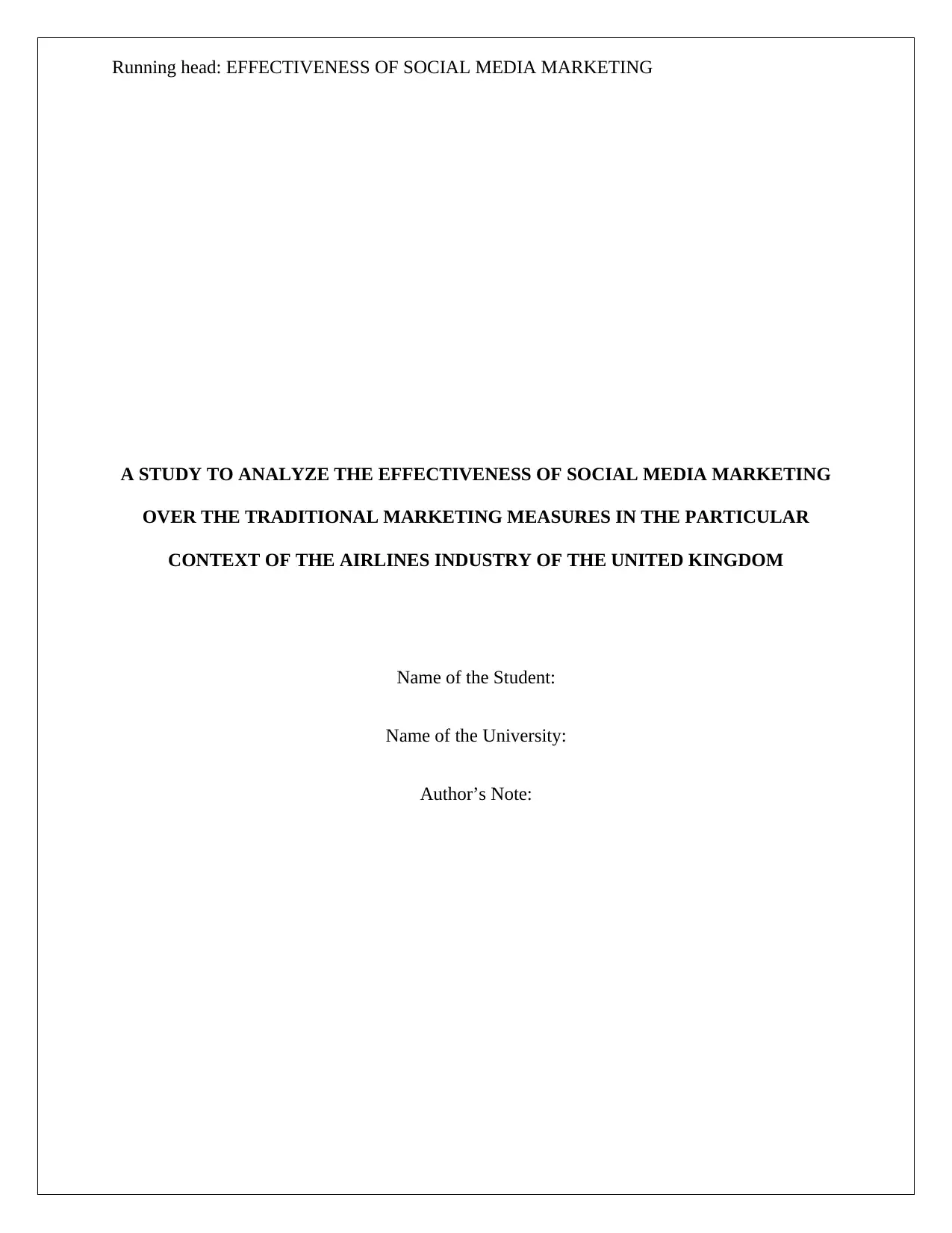
Running head: EFFECTIVENESS OF SOCIAL MEDIA MARKETING
A STUDY TO ANALYZE THE EFFECTIVENESS OF SOCIAL MEDIA MARKETING
OVER THE TRADITIONAL MARKETING MEASURES IN THE PARTICULAR
CONTEXT OF THE AIRLINES INDUSTRY OF THE UNITED KINGDOM
Name of the Student:
Name of the University:
Author’s Note:
A STUDY TO ANALYZE THE EFFECTIVENESS OF SOCIAL MEDIA MARKETING
OVER THE TRADITIONAL MARKETING MEASURES IN THE PARTICULAR
CONTEXT OF THE AIRLINES INDUSTRY OF THE UNITED KINGDOM
Name of the Student:
Name of the University:
Author’s Note:
Paraphrase This Document
Need a fresh take? Get an instant paraphrase of this document with our AI Paraphraser
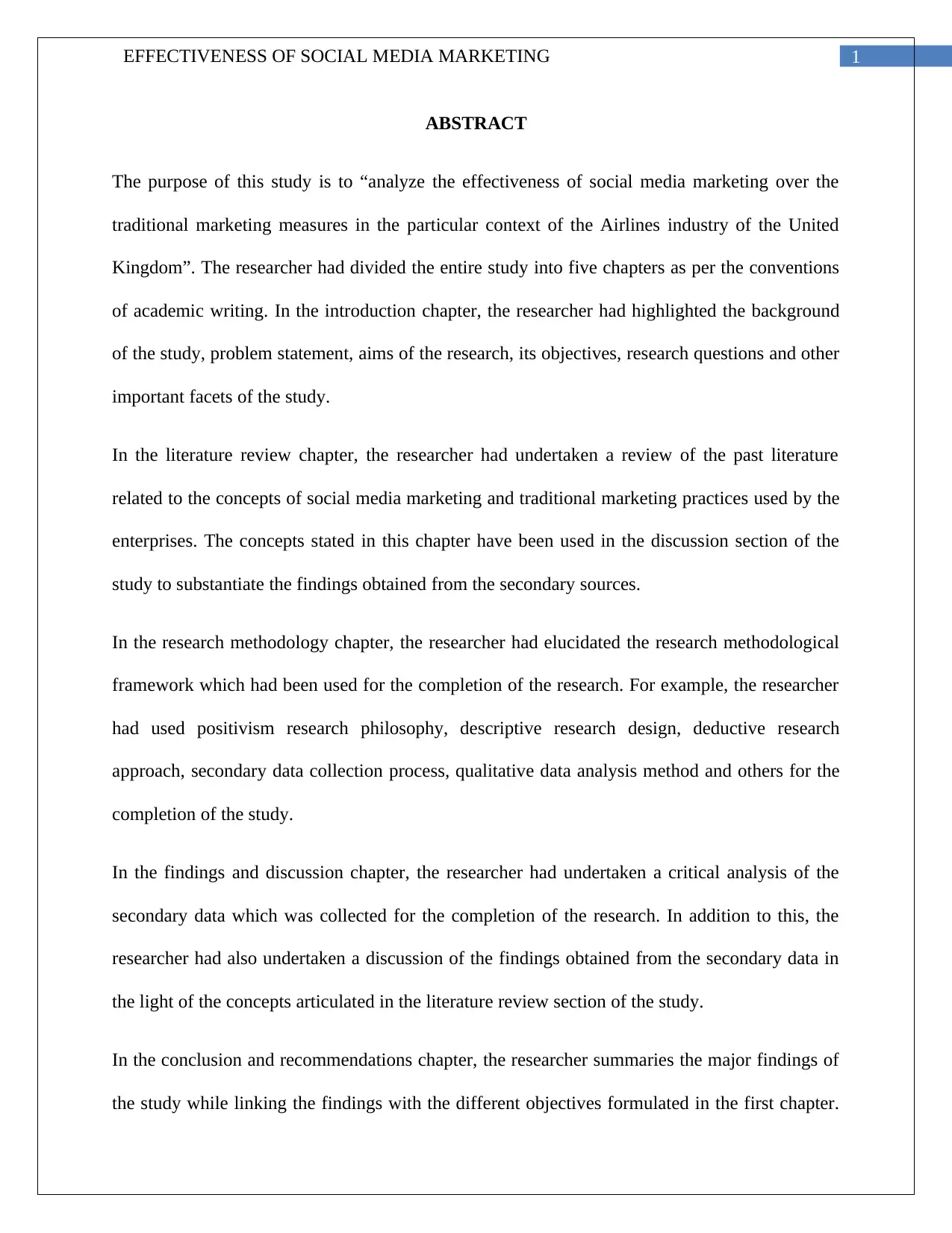
1EFFECTIVENESS OF SOCIAL MEDIA MARKETING
ABSTRACT
The purpose of this study is to “analyze the effectiveness of social media marketing over the
traditional marketing measures in the particular context of the Airlines industry of the United
Kingdom”. The researcher had divided the entire study into five chapters as per the conventions
of academic writing. In the introduction chapter, the researcher had highlighted the background
of the study, problem statement, aims of the research, its objectives, research questions and other
important facets of the study.
In the literature review chapter, the researcher had undertaken a review of the past literature
related to the concepts of social media marketing and traditional marketing practices used by the
enterprises. The concepts stated in this chapter have been used in the discussion section of the
study to substantiate the findings obtained from the secondary sources.
In the research methodology chapter, the researcher had elucidated the research methodological
framework which had been used for the completion of the research. For example, the researcher
had used positivism research philosophy, descriptive research design, deductive research
approach, secondary data collection process, qualitative data analysis method and others for the
completion of the study.
In the findings and discussion chapter, the researcher had undertaken a critical analysis of the
secondary data which was collected for the completion of the research. In addition to this, the
researcher had also undertaken a discussion of the findings obtained from the secondary data in
the light of the concepts articulated in the literature review section of the study.
In the conclusion and recommendations chapter, the researcher summaries the major findings of
the study while linking the findings with the different objectives formulated in the first chapter.
ABSTRACT
The purpose of this study is to “analyze the effectiveness of social media marketing over the
traditional marketing measures in the particular context of the Airlines industry of the United
Kingdom”. The researcher had divided the entire study into five chapters as per the conventions
of academic writing. In the introduction chapter, the researcher had highlighted the background
of the study, problem statement, aims of the research, its objectives, research questions and other
important facets of the study.
In the literature review chapter, the researcher had undertaken a review of the past literature
related to the concepts of social media marketing and traditional marketing practices used by the
enterprises. The concepts stated in this chapter have been used in the discussion section of the
study to substantiate the findings obtained from the secondary sources.
In the research methodology chapter, the researcher had elucidated the research methodological
framework which had been used for the completion of the research. For example, the researcher
had used positivism research philosophy, descriptive research design, deductive research
approach, secondary data collection process, qualitative data analysis method and others for the
completion of the study.
In the findings and discussion chapter, the researcher had undertaken a critical analysis of the
secondary data which was collected for the completion of the research. In addition to this, the
researcher had also undertaken a discussion of the findings obtained from the secondary data in
the light of the concepts articulated in the literature review section of the study.
In the conclusion and recommendations chapter, the researcher summaries the major findings of
the study while linking the findings with the different objectives formulated in the first chapter.
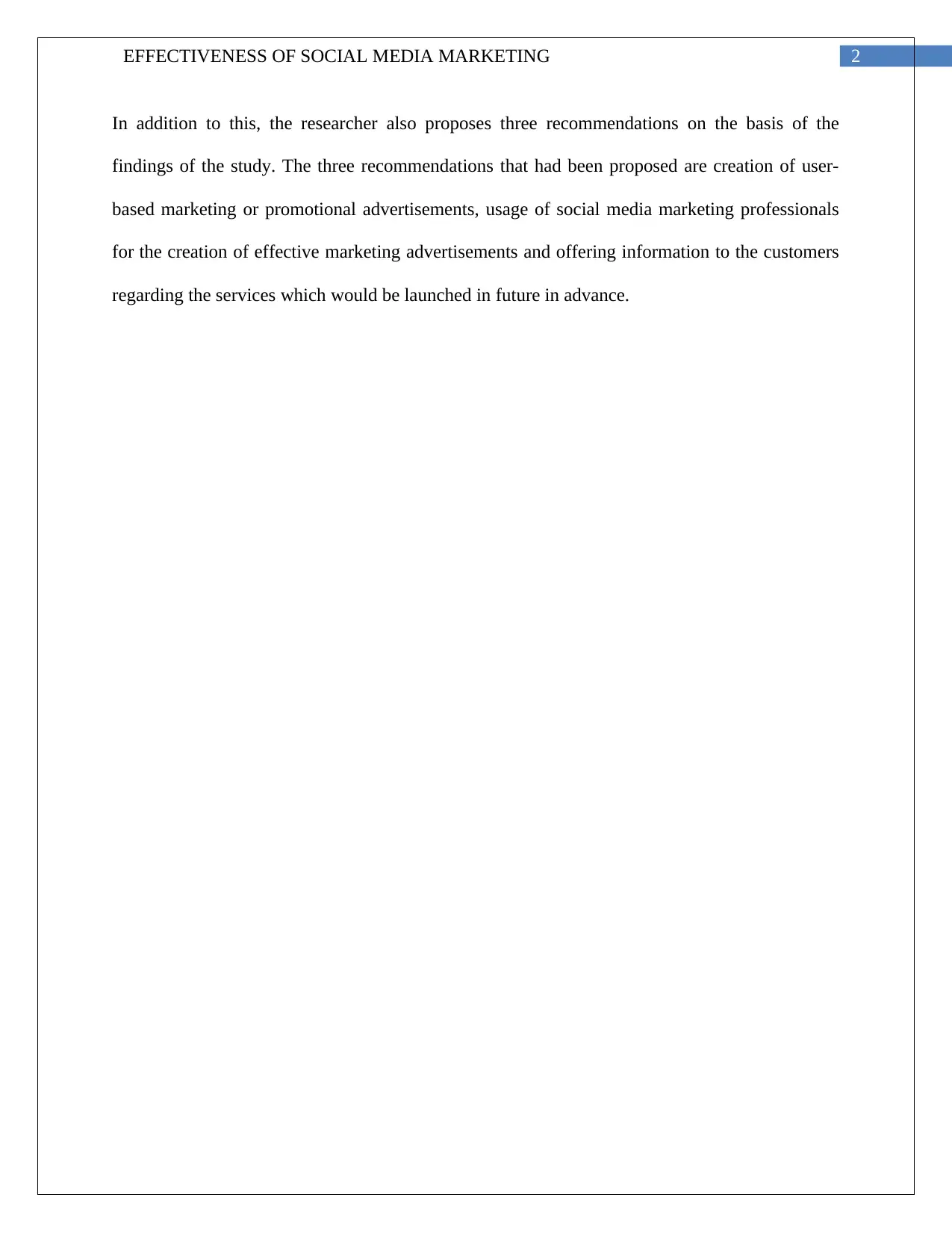
2EFFECTIVENESS OF SOCIAL MEDIA MARKETING
In addition to this, the researcher also proposes three recommendations on the basis of the
findings of the study. The three recommendations that had been proposed are creation of user-
based marketing or promotional advertisements, usage of social media marketing professionals
for the creation of effective marketing advertisements and offering information to the customers
regarding the services which would be launched in future in advance.
In addition to this, the researcher also proposes three recommendations on the basis of the
findings of the study. The three recommendations that had been proposed are creation of user-
based marketing or promotional advertisements, usage of social media marketing professionals
for the creation of effective marketing advertisements and offering information to the customers
regarding the services which would be launched in future in advance.
⊘ This is a preview!⊘
Do you want full access?
Subscribe today to unlock all pages.

Trusted by 1+ million students worldwide
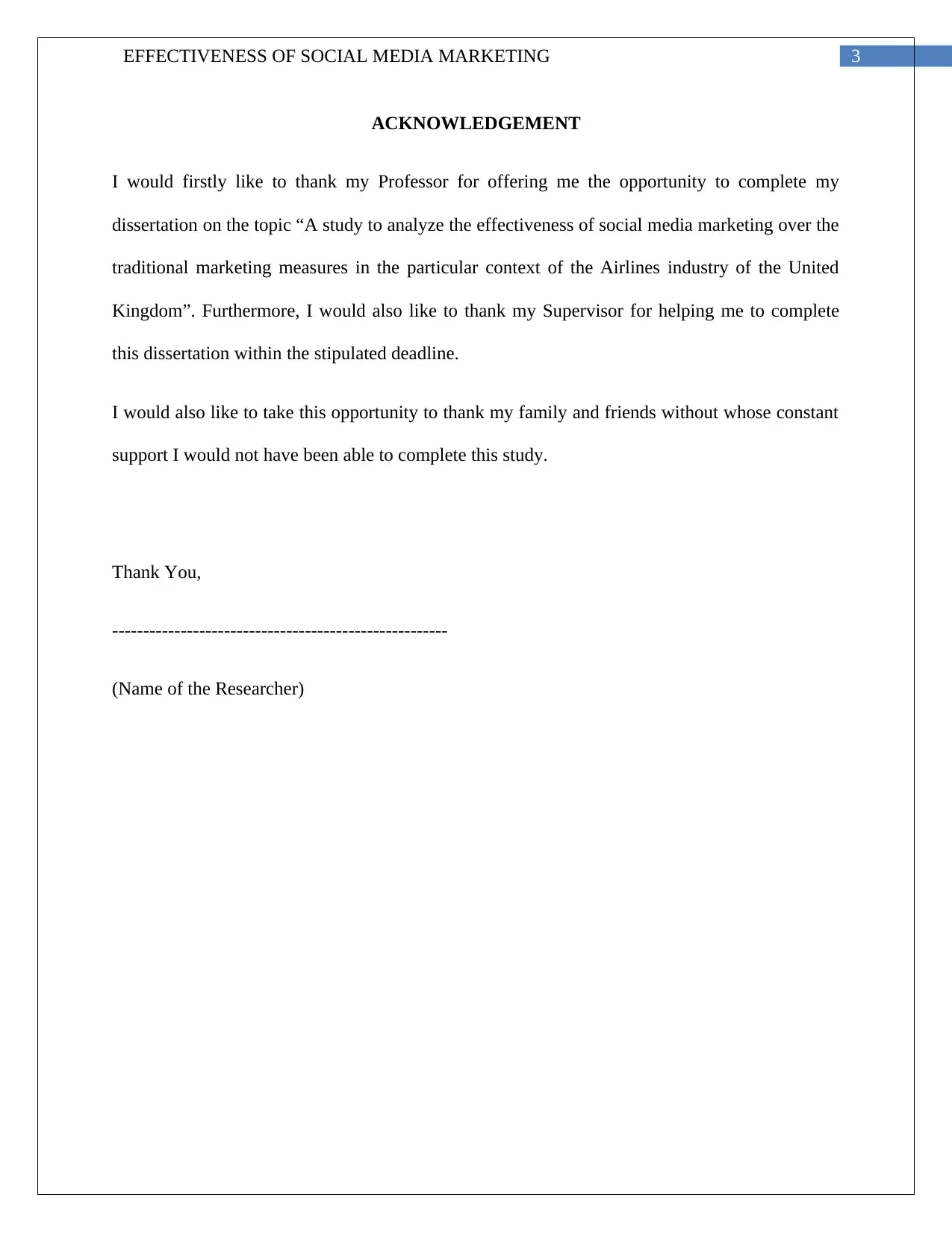
3EFFECTIVENESS OF SOCIAL MEDIA MARKETING
ACKNOWLEDGEMENT
I would firstly like to thank my Professor for offering me the opportunity to complete my
dissertation on the topic “A study to analyze the effectiveness of social media marketing over the
traditional marketing measures in the particular context of the Airlines industry of the United
Kingdom”. Furthermore, I would also like to thank my Supervisor for helping me to complete
this dissertation within the stipulated deadline.
I would also like to take this opportunity to thank my family and friends without whose constant
support I would not have been able to complete this study.
Thank You,
------------------------------------------------------
(Name of the Researcher)
ACKNOWLEDGEMENT
I would firstly like to thank my Professor for offering me the opportunity to complete my
dissertation on the topic “A study to analyze the effectiveness of social media marketing over the
traditional marketing measures in the particular context of the Airlines industry of the United
Kingdom”. Furthermore, I would also like to thank my Supervisor for helping me to complete
this dissertation within the stipulated deadline.
I would also like to take this opportunity to thank my family and friends without whose constant
support I would not have been able to complete this study.
Thank You,
------------------------------------------------------
(Name of the Researcher)
Paraphrase This Document
Need a fresh take? Get an instant paraphrase of this document with our AI Paraphraser
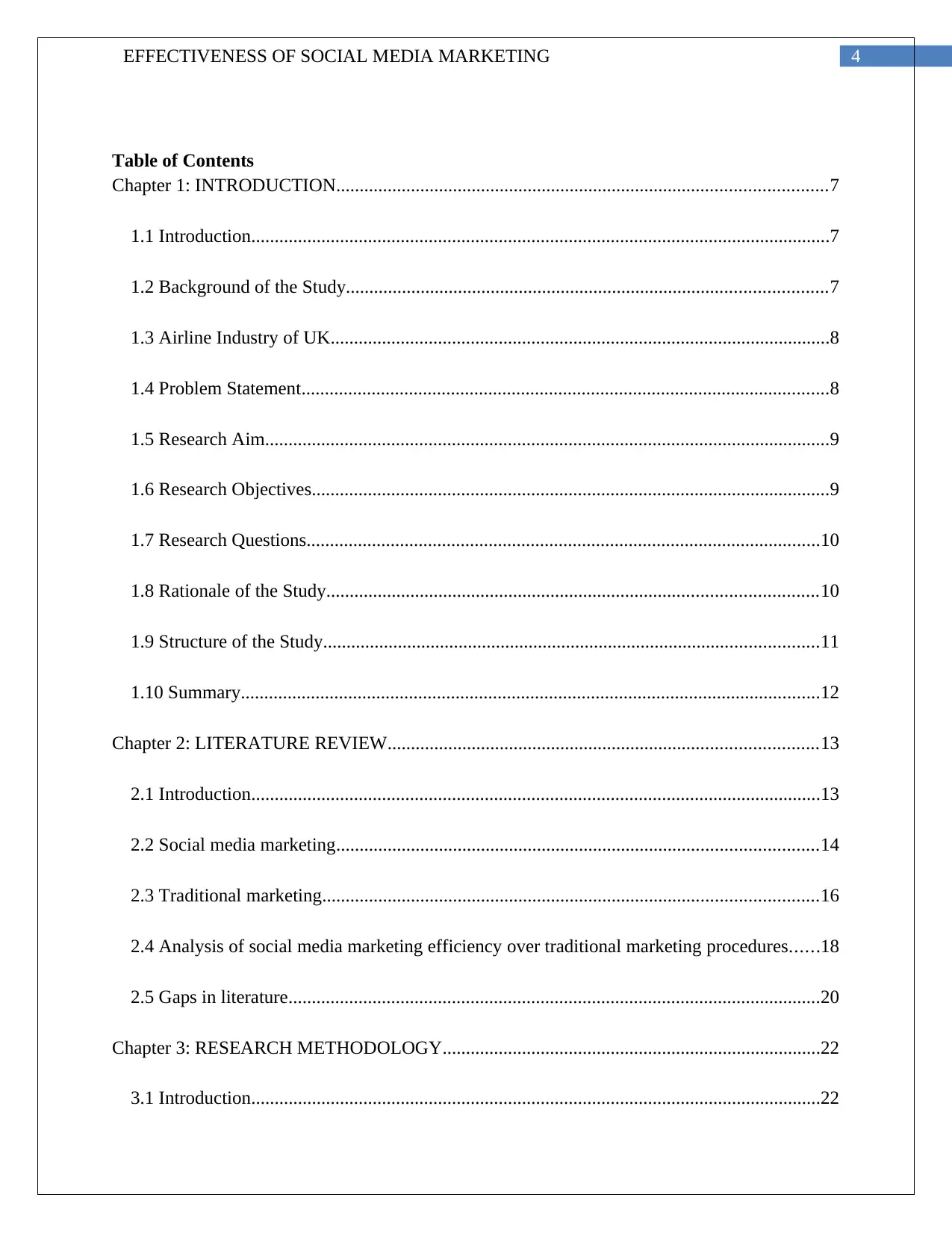
4EFFECTIVENESS OF SOCIAL MEDIA MARKETING
Table of Contents
Chapter 1: INTRODUCTION.........................................................................................................7
1.1 Introduction............................................................................................................................7
1.2 Background of the Study.......................................................................................................7
1.3 Airline Industry of UK...........................................................................................................8
1.4 Problem Statement.................................................................................................................8
1.5 Research Aim.........................................................................................................................9
1.6 Research Objectives...............................................................................................................9
1.7 Research Questions..............................................................................................................10
1.8 Rationale of the Study.........................................................................................................10
1.9 Structure of the Study..........................................................................................................11
1.10 Summary............................................................................................................................12
Chapter 2: LITERATURE REVIEW............................................................................................13
2.1 Introduction..........................................................................................................................13
2.2 Social media marketing.......................................................................................................14
2.3 Traditional marketing..........................................................................................................16
2.4 Analysis of social media marketing efficiency over traditional marketing procedures......18
2.5 Gaps in literature..................................................................................................................20
Chapter 3: RESEARCH METHODOLOGY.................................................................................22
3.1 Introduction..........................................................................................................................22
Table of Contents
Chapter 1: INTRODUCTION.........................................................................................................7
1.1 Introduction............................................................................................................................7
1.2 Background of the Study.......................................................................................................7
1.3 Airline Industry of UK...........................................................................................................8
1.4 Problem Statement.................................................................................................................8
1.5 Research Aim.........................................................................................................................9
1.6 Research Objectives...............................................................................................................9
1.7 Research Questions..............................................................................................................10
1.8 Rationale of the Study.........................................................................................................10
1.9 Structure of the Study..........................................................................................................11
1.10 Summary............................................................................................................................12
Chapter 2: LITERATURE REVIEW............................................................................................13
2.1 Introduction..........................................................................................................................13
2.2 Social media marketing.......................................................................................................14
2.3 Traditional marketing..........................................................................................................16
2.4 Analysis of social media marketing efficiency over traditional marketing procedures......18
2.5 Gaps in literature..................................................................................................................20
Chapter 3: RESEARCH METHODOLOGY.................................................................................22
3.1 Introduction..........................................................................................................................22
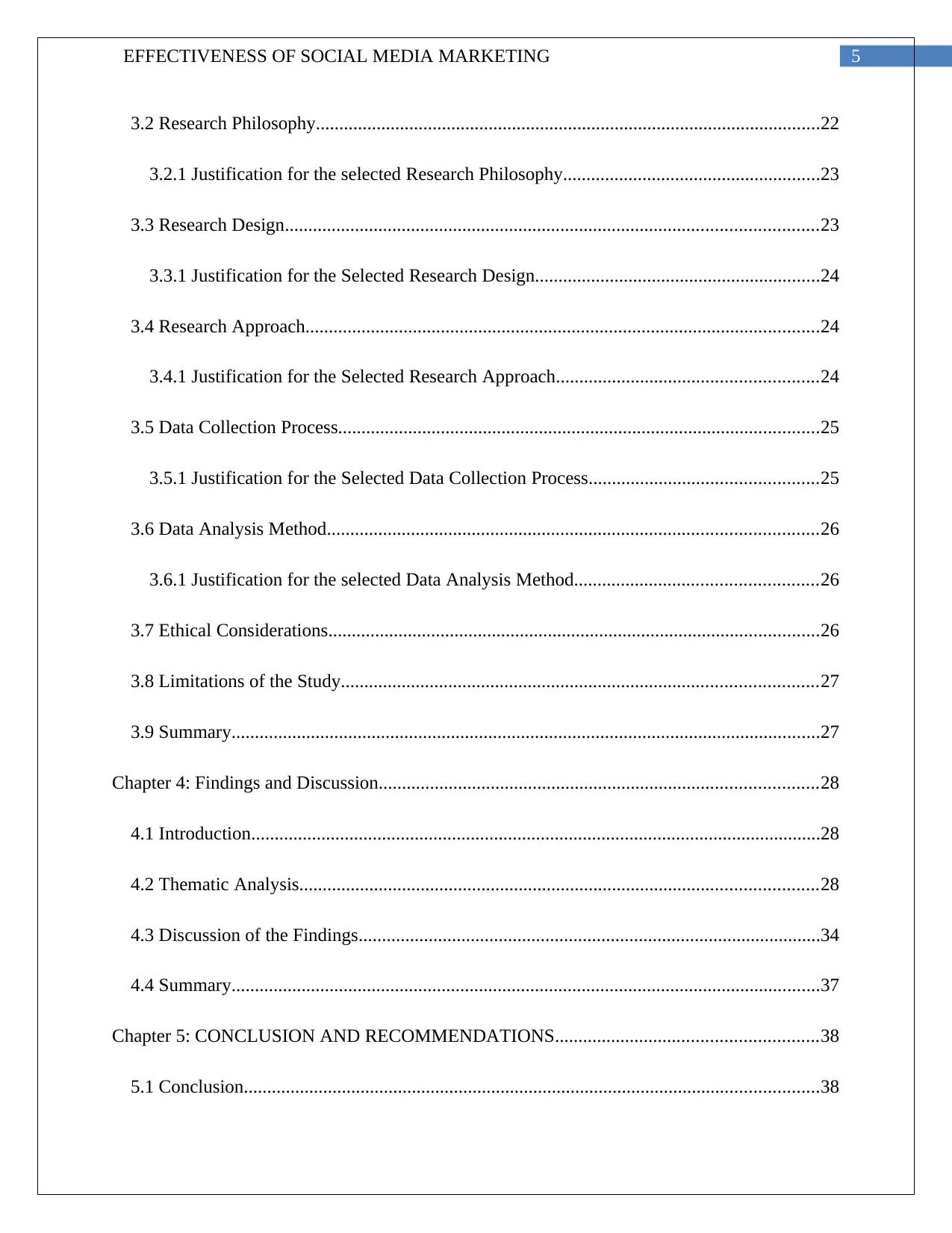
5EFFECTIVENESS OF SOCIAL MEDIA MARKETING
3.2 Research Philosophy............................................................................................................22
3.2.1 Justification for the selected Research Philosophy.......................................................23
3.3 Research Design..................................................................................................................23
3.3.1 Justification for the Selected Research Design.............................................................24
3.4 Research Approach..............................................................................................................24
3.4.1 Justification for the Selected Research Approach........................................................24
3.5 Data Collection Process.......................................................................................................25
3.5.1 Justification for the Selected Data Collection Process.................................................25
3.6 Data Analysis Method.........................................................................................................26
3.6.1 Justification for the selected Data Analysis Method....................................................26
3.7 Ethical Considerations.........................................................................................................26
3.8 Limitations of the Study......................................................................................................27
3.9 Summary..............................................................................................................................27
Chapter 4: Findings and Discussion..............................................................................................28
4.1 Introduction..........................................................................................................................28
4.2 Thematic Analysis...............................................................................................................28
4.3 Discussion of the Findings...................................................................................................34
4.4 Summary..............................................................................................................................37
Chapter 5: CONCLUSION AND RECOMMENDATIONS........................................................38
5.1 Conclusion...........................................................................................................................38
3.2 Research Philosophy............................................................................................................22
3.2.1 Justification for the selected Research Philosophy.......................................................23
3.3 Research Design..................................................................................................................23
3.3.1 Justification for the Selected Research Design.............................................................24
3.4 Research Approach..............................................................................................................24
3.4.1 Justification for the Selected Research Approach........................................................24
3.5 Data Collection Process.......................................................................................................25
3.5.1 Justification for the Selected Data Collection Process.................................................25
3.6 Data Analysis Method.........................................................................................................26
3.6.1 Justification for the selected Data Analysis Method....................................................26
3.7 Ethical Considerations.........................................................................................................26
3.8 Limitations of the Study......................................................................................................27
3.9 Summary..............................................................................................................................27
Chapter 4: Findings and Discussion..............................................................................................28
4.1 Introduction..........................................................................................................................28
4.2 Thematic Analysis...............................................................................................................28
4.3 Discussion of the Findings...................................................................................................34
4.4 Summary..............................................................................................................................37
Chapter 5: CONCLUSION AND RECOMMENDATIONS........................................................38
5.1 Conclusion...........................................................................................................................38
⊘ This is a preview!⊘
Do you want full access?
Subscribe today to unlock all pages.

Trusted by 1+ million students worldwide
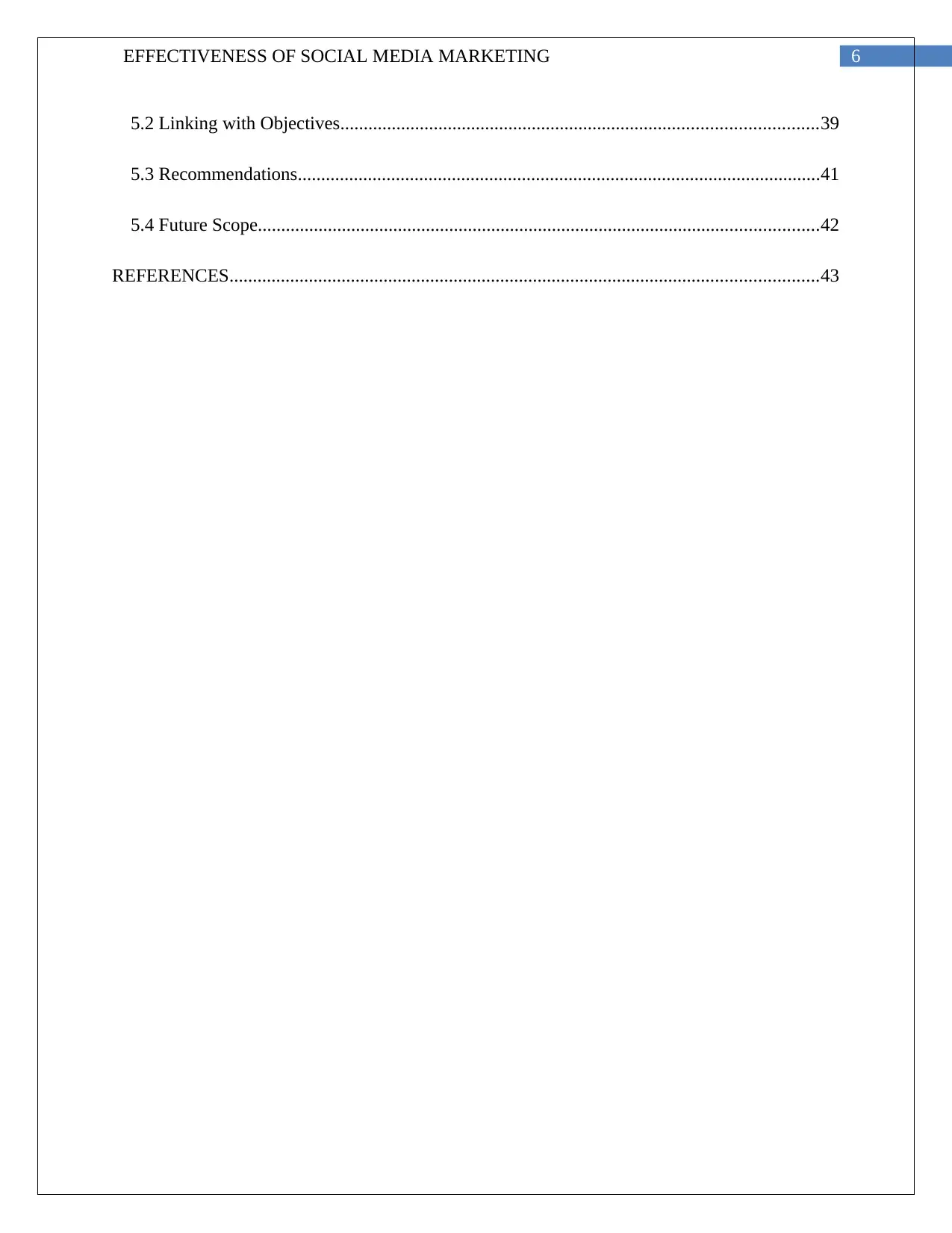
6EFFECTIVENESS OF SOCIAL MEDIA MARKETING
5.2 Linking with Objectives......................................................................................................39
5.3 Recommendations................................................................................................................41
5.4 Future Scope........................................................................................................................42
REFERENCES..............................................................................................................................43
5.2 Linking with Objectives......................................................................................................39
5.3 Recommendations................................................................................................................41
5.4 Future Scope........................................................................................................................42
REFERENCES..............................................................................................................................43
Paraphrase This Document
Need a fresh take? Get an instant paraphrase of this document with our AI Paraphraser
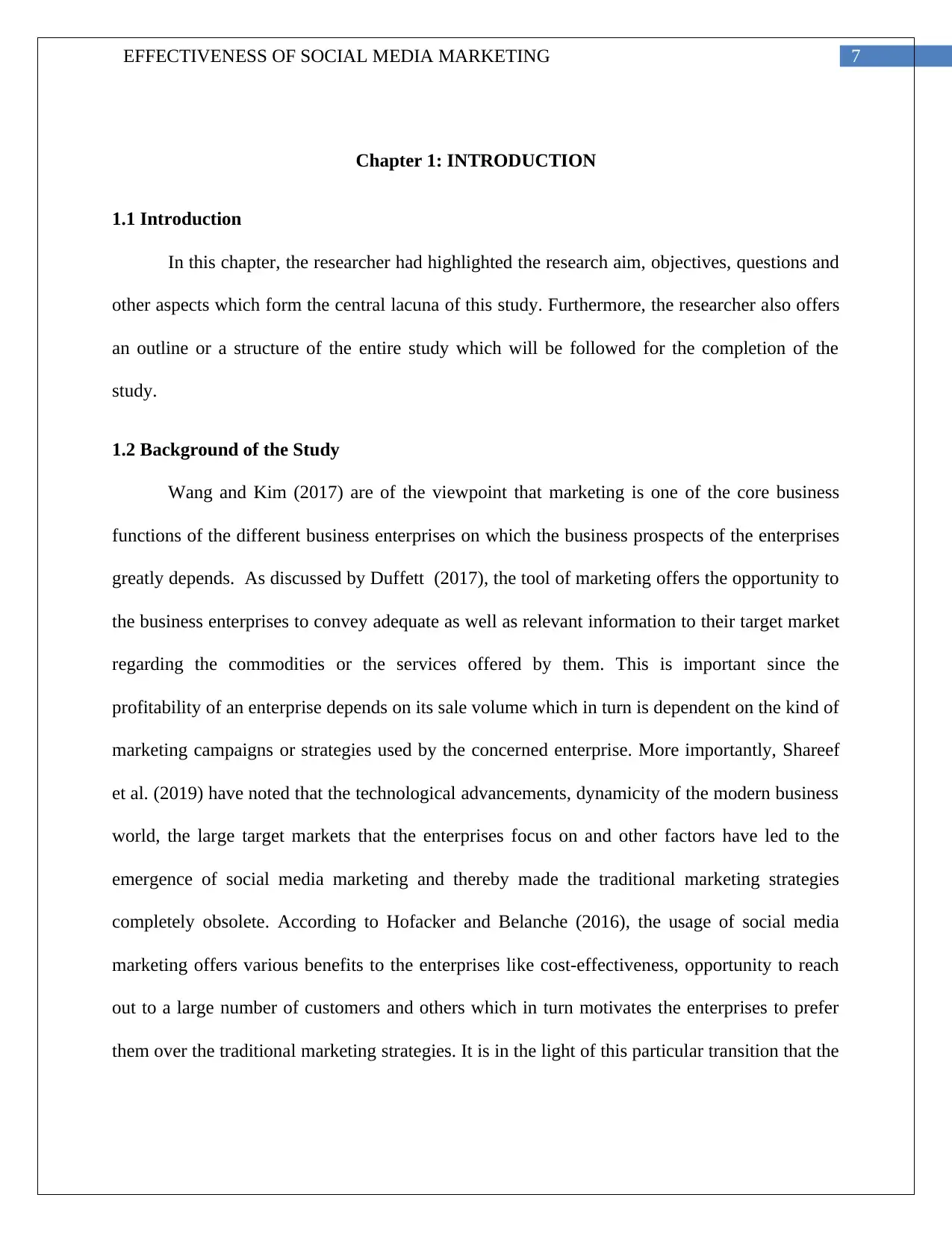
7EFFECTIVENESS OF SOCIAL MEDIA MARKETING
Chapter 1: INTRODUCTION
1.1 Introduction
In this chapter, the researcher had highlighted the research aim, objectives, questions and
other aspects which form the central lacuna of this study. Furthermore, the researcher also offers
an outline or a structure of the entire study which will be followed for the completion of the
study.
1.2 Background of the Study
Wang and Kim (2017) are of the viewpoint that marketing is one of the core business
functions of the different business enterprises on which the business prospects of the enterprises
greatly depends. As discussed by Duffett (2017), the tool of marketing offers the opportunity to
the business enterprises to convey adequate as well as relevant information to their target market
regarding the commodities or the services offered by them. This is important since the
profitability of an enterprise depends on its sale volume which in turn is dependent on the kind of
marketing campaigns or strategies used by the concerned enterprise. More importantly, Shareef
et al. (2019) have noted that the technological advancements, dynamicity of the modern business
world, the large target markets that the enterprises focus on and other factors have led to the
emergence of social media marketing and thereby made the traditional marketing strategies
completely obsolete. According to Hofacker and Belanche (2016), the usage of social media
marketing offers various benefits to the enterprises like cost-effectiveness, opportunity to reach
out to a large number of customers and others which in turn motivates the enterprises to prefer
them over the traditional marketing strategies. It is in the light of this particular transition that the
Chapter 1: INTRODUCTION
1.1 Introduction
In this chapter, the researcher had highlighted the research aim, objectives, questions and
other aspects which form the central lacuna of this study. Furthermore, the researcher also offers
an outline or a structure of the entire study which will be followed for the completion of the
study.
1.2 Background of the Study
Wang and Kim (2017) are of the viewpoint that marketing is one of the core business
functions of the different business enterprises on which the business prospects of the enterprises
greatly depends. As discussed by Duffett (2017), the tool of marketing offers the opportunity to
the business enterprises to convey adequate as well as relevant information to their target market
regarding the commodities or the services offered by them. This is important since the
profitability of an enterprise depends on its sale volume which in turn is dependent on the kind of
marketing campaigns or strategies used by the concerned enterprise. More importantly, Shareef
et al. (2019) have noted that the technological advancements, dynamicity of the modern business
world, the large target markets that the enterprises focus on and other factors have led to the
emergence of social media marketing and thereby made the traditional marketing strategies
completely obsolete. According to Hofacker and Belanche (2016), the usage of social media
marketing offers various benefits to the enterprises like cost-effectiveness, opportunity to reach
out to a large number of customers and others which in turn motivates the enterprises to prefer
them over the traditional marketing strategies. It is in the light of this particular transition that the
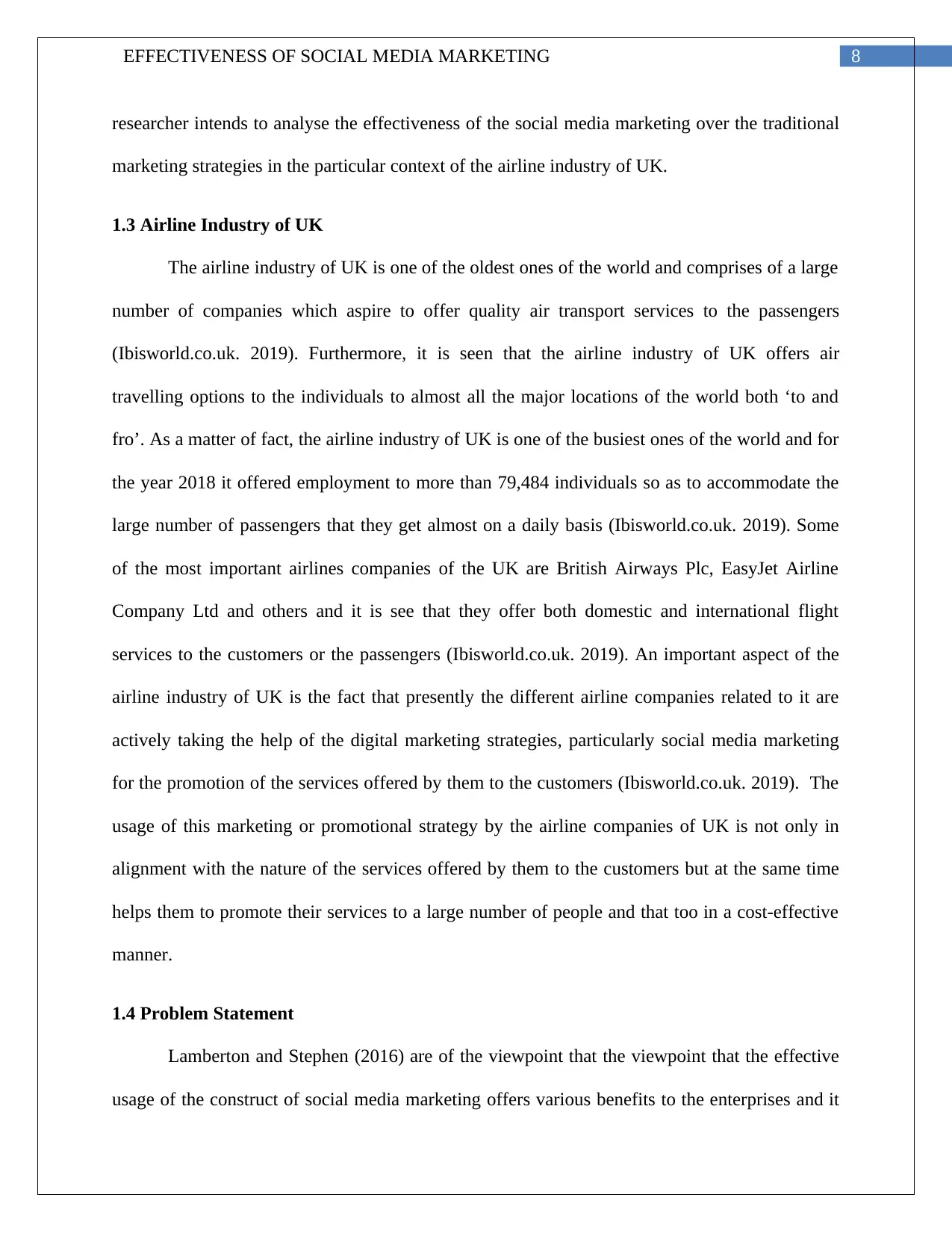
8EFFECTIVENESS OF SOCIAL MEDIA MARKETING
researcher intends to analyse the effectiveness of the social media marketing over the traditional
marketing strategies in the particular context of the airline industry of UK.
1.3 Airline Industry of UK
The airline industry of UK is one of the oldest ones of the world and comprises of a large
number of companies which aspire to offer quality air transport services to the passengers
(Ibisworld.co.uk. 2019). Furthermore, it is seen that the airline industry of UK offers air
travelling options to the individuals to almost all the major locations of the world both ‘to and
fro’. As a matter of fact, the airline industry of UK is one of the busiest ones of the world and for
the year 2018 it offered employment to more than 79,484 individuals so as to accommodate the
large number of passengers that they get almost on a daily basis (Ibisworld.co.uk. 2019). Some
of the most important airlines companies of the UK are British Airways Plc, EasyJet Airline
Company Ltd and others and it is see that they offer both domestic and international flight
services to the customers or the passengers (Ibisworld.co.uk. 2019). An important aspect of the
airline industry of UK is the fact that presently the different airline companies related to it are
actively taking the help of the digital marketing strategies, particularly social media marketing
for the promotion of the services offered by them to the customers (Ibisworld.co.uk. 2019). The
usage of this marketing or promotional strategy by the airline companies of UK is not only in
alignment with the nature of the services offered by them to the customers but at the same time
helps them to promote their services to a large number of people and that too in a cost-effective
manner.
1.4 Problem Statement
Lamberton and Stephen (2016) are of the viewpoint that the viewpoint that the effective
usage of the construct of social media marketing offers various benefits to the enterprises and it
researcher intends to analyse the effectiveness of the social media marketing over the traditional
marketing strategies in the particular context of the airline industry of UK.
1.3 Airline Industry of UK
The airline industry of UK is one of the oldest ones of the world and comprises of a large
number of companies which aspire to offer quality air transport services to the passengers
(Ibisworld.co.uk. 2019). Furthermore, it is seen that the airline industry of UK offers air
travelling options to the individuals to almost all the major locations of the world both ‘to and
fro’. As a matter of fact, the airline industry of UK is one of the busiest ones of the world and for
the year 2018 it offered employment to more than 79,484 individuals so as to accommodate the
large number of passengers that they get almost on a daily basis (Ibisworld.co.uk. 2019). Some
of the most important airlines companies of the UK are British Airways Plc, EasyJet Airline
Company Ltd and others and it is see that they offer both domestic and international flight
services to the customers or the passengers (Ibisworld.co.uk. 2019). An important aspect of the
airline industry of UK is the fact that presently the different airline companies related to it are
actively taking the help of the digital marketing strategies, particularly social media marketing
for the promotion of the services offered by them to the customers (Ibisworld.co.uk. 2019). The
usage of this marketing or promotional strategy by the airline companies of UK is not only in
alignment with the nature of the services offered by them to the customers but at the same time
helps them to promote their services to a large number of people and that too in a cost-effective
manner.
1.4 Problem Statement
Lamberton and Stephen (2016) are of the viewpoint that the viewpoint that the effective
usage of the construct of social media marketing offers various benefits to the enterprises and it
⊘ This is a preview!⊘
Do you want full access?
Subscribe today to unlock all pages.

Trusted by 1+ million students worldwide
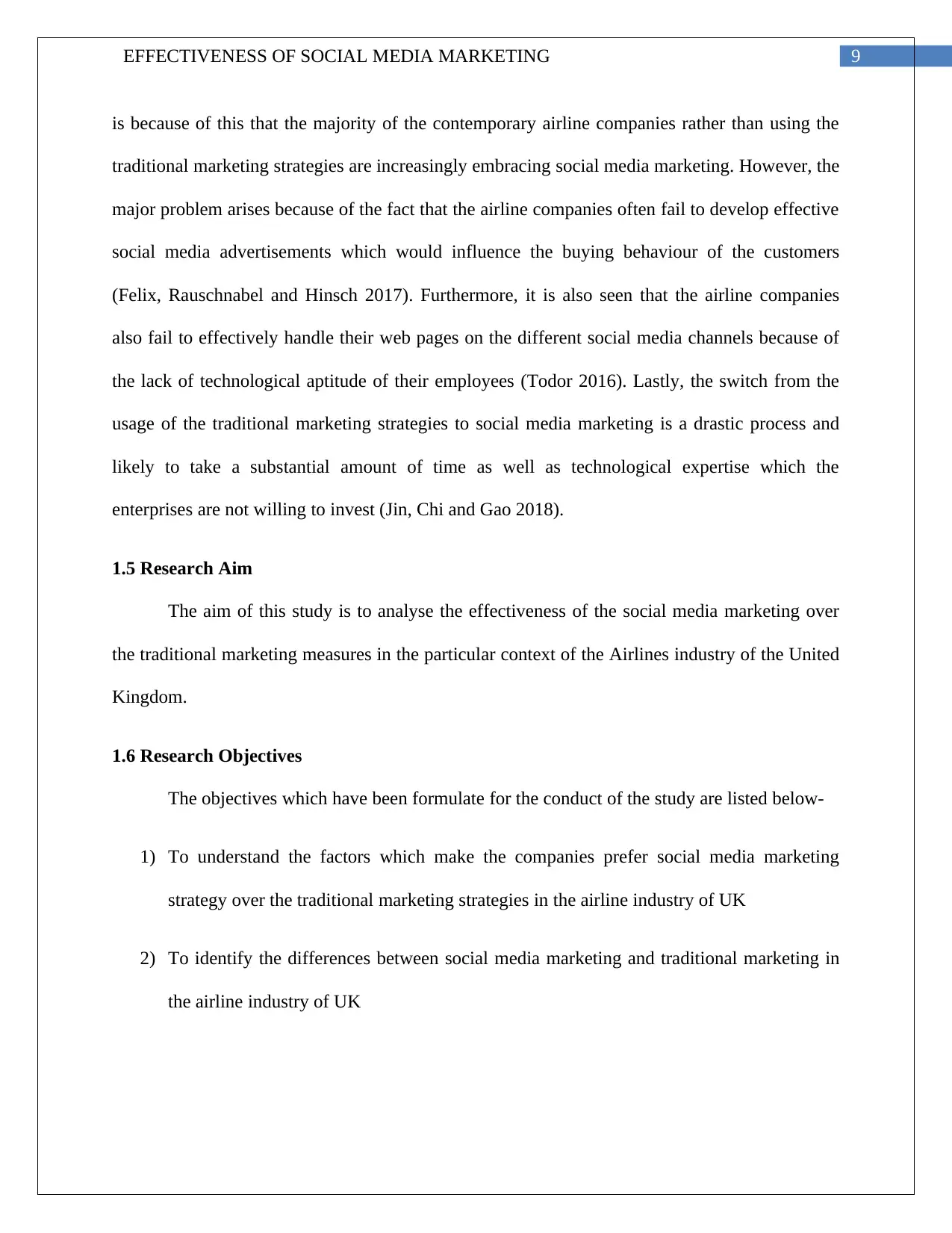
9EFFECTIVENESS OF SOCIAL MEDIA MARKETING
is because of this that the majority of the contemporary airline companies rather than using the
traditional marketing strategies are increasingly embracing social media marketing. However, the
major problem arises because of the fact that the airline companies often fail to develop effective
social media advertisements which would influence the buying behaviour of the customers
(Felix, Rauschnabel and Hinsch 2017). Furthermore, it is also seen that the airline companies
also fail to effectively handle their web pages on the different social media channels because of
the lack of technological aptitude of their employees (Todor 2016). Lastly, the switch from the
usage of the traditional marketing strategies to social media marketing is a drastic process and
likely to take a substantial amount of time as well as technological expertise which the
enterprises are not willing to invest (Jin, Chi and Gao 2018).
1.5 Research Aim
The aim of this study is to analyse the effectiveness of the social media marketing over
the traditional marketing measures in the particular context of the Airlines industry of the United
Kingdom.
1.6 Research Objectives
The objectives which have been formulate for the conduct of the study are listed below-
1) To understand the factors which make the companies prefer social media marketing
strategy over the traditional marketing strategies in the airline industry of UK
2) To identify the differences between social media marketing and traditional marketing in
the airline industry of UK
is because of this that the majority of the contemporary airline companies rather than using the
traditional marketing strategies are increasingly embracing social media marketing. However, the
major problem arises because of the fact that the airline companies often fail to develop effective
social media advertisements which would influence the buying behaviour of the customers
(Felix, Rauschnabel and Hinsch 2017). Furthermore, it is also seen that the airline companies
also fail to effectively handle their web pages on the different social media channels because of
the lack of technological aptitude of their employees (Todor 2016). Lastly, the switch from the
usage of the traditional marketing strategies to social media marketing is a drastic process and
likely to take a substantial amount of time as well as technological expertise which the
enterprises are not willing to invest (Jin, Chi and Gao 2018).
1.5 Research Aim
The aim of this study is to analyse the effectiveness of the social media marketing over
the traditional marketing measures in the particular context of the Airlines industry of the United
Kingdom.
1.6 Research Objectives
The objectives which have been formulate for the conduct of the study are listed below-
1) To understand the factors which make the companies prefer social media marketing
strategy over the traditional marketing strategies in the airline industry of UK
2) To identify the differences between social media marketing and traditional marketing in
the airline industry of UK
Paraphrase This Document
Need a fresh take? Get an instant paraphrase of this document with our AI Paraphraser
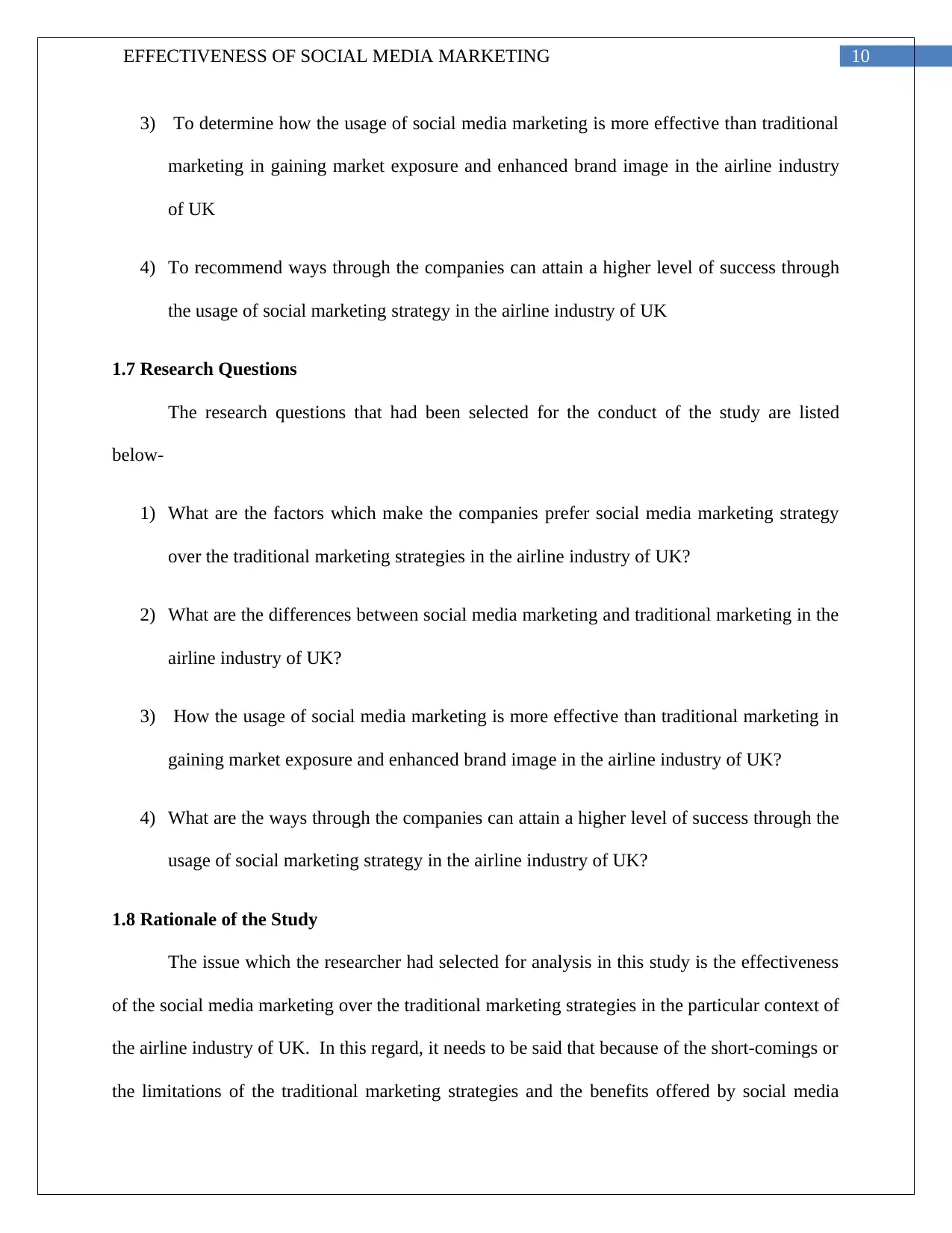
10EFFECTIVENESS OF SOCIAL MEDIA MARKETING
3) To determine how the usage of social media marketing is more effective than traditional
marketing in gaining market exposure and enhanced brand image in the airline industry
of UK
4) To recommend ways through the companies can attain a higher level of success through
the usage of social marketing strategy in the airline industry of UK
1.7 Research Questions
The research questions that had been selected for the conduct of the study are listed
below-
1) What are the factors which make the companies prefer social media marketing strategy
over the traditional marketing strategies in the airline industry of UK?
2) What are the differences between social media marketing and traditional marketing in the
airline industry of UK?
3) How the usage of social media marketing is more effective than traditional marketing in
gaining market exposure and enhanced brand image in the airline industry of UK?
4) What are the ways through the companies can attain a higher level of success through the
usage of social marketing strategy in the airline industry of UK?
1.8 Rationale of the Study
The issue which the researcher had selected for analysis in this study is the effectiveness
of the social media marketing over the traditional marketing strategies in the particular context of
the airline industry of UK. In this regard, it needs to be said that because of the short-comings or
the limitations of the traditional marketing strategies and the benefits offered by social media
3) To determine how the usage of social media marketing is more effective than traditional
marketing in gaining market exposure and enhanced brand image in the airline industry
of UK
4) To recommend ways through the companies can attain a higher level of success through
the usage of social marketing strategy in the airline industry of UK
1.7 Research Questions
The research questions that had been selected for the conduct of the study are listed
below-
1) What are the factors which make the companies prefer social media marketing strategy
over the traditional marketing strategies in the airline industry of UK?
2) What are the differences between social media marketing and traditional marketing in the
airline industry of UK?
3) How the usage of social media marketing is more effective than traditional marketing in
gaining market exposure and enhanced brand image in the airline industry of UK?
4) What are the ways through the companies can attain a higher level of success through the
usage of social marketing strategy in the airline industry of UK?
1.8 Rationale of the Study
The issue which the researcher had selected for analysis in this study is the effectiveness
of the social media marketing over the traditional marketing strategies in the particular context of
the airline industry of UK. In this regard, it needs to be said that because of the short-comings or
the limitations of the traditional marketing strategies and the benefits offered by social media
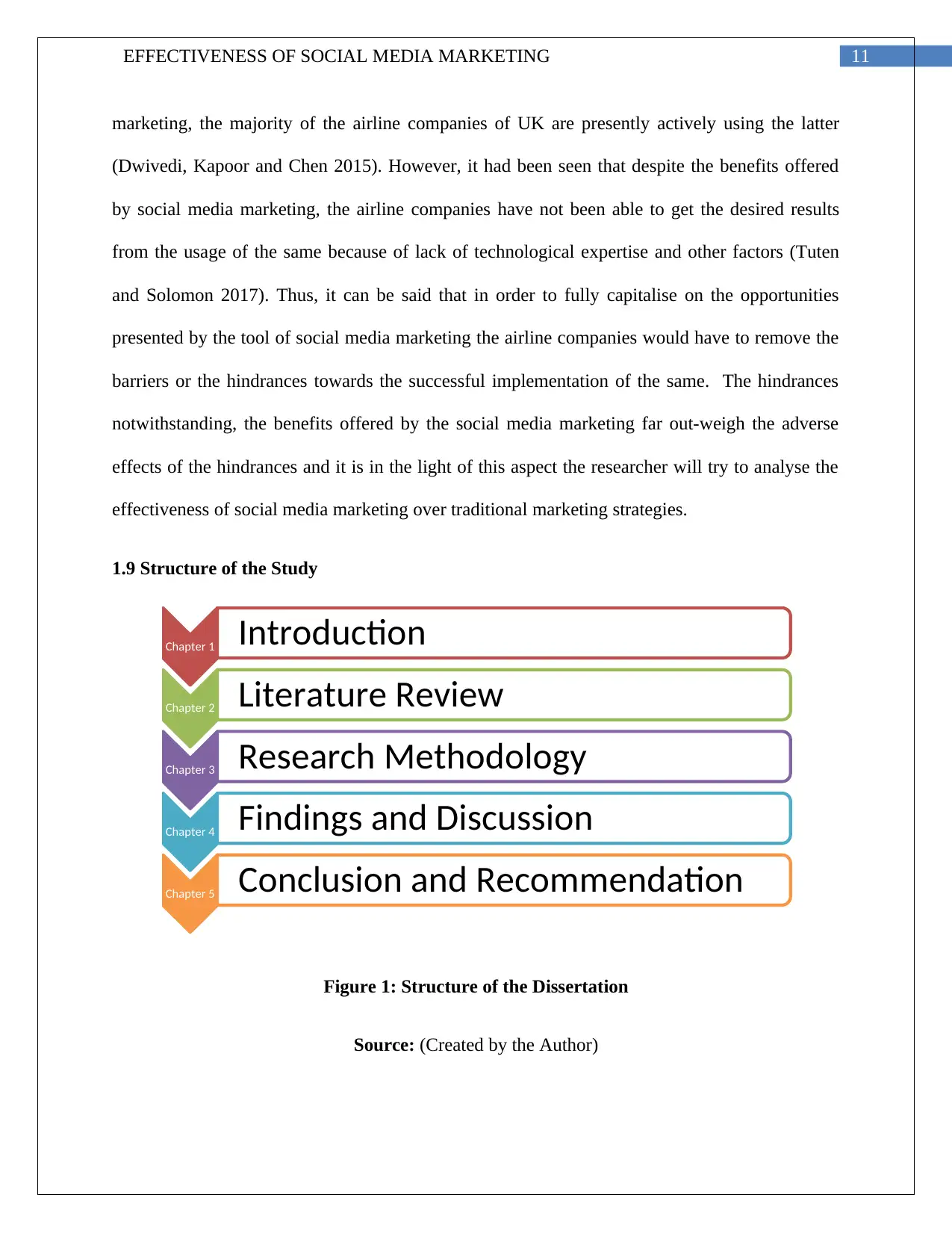
11EFFECTIVENESS OF SOCIAL MEDIA MARKETING
marketing, the majority of the airline companies of UK are presently actively using the latter
(Dwivedi, Kapoor and Chen 2015). However, it had been seen that despite the benefits offered
by social media marketing, the airline companies have not been able to get the desired results
from the usage of the same because of lack of technological expertise and other factors (Tuten
and Solomon 2017). Thus, it can be said that in order to fully capitalise on the opportunities
presented by the tool of social media marketing the airline companies would have to remove the
barriers or the hindrances towards the successful implementation of the same. The hindrances
notwithstanding, the benefits offered by the social media marketing far out-weigh the adverse
effects of the hindrances and it is in the light of this aspect the researcher will try to analyse the
effectiveness of social media marketing over traditional marketing strategies.
1.9 Structure of the Study
Figure 1: Structure of the Dissertation
Source: (Created by the Author)
Chapter 1 Introduction
Chapter 2 Literature Review
Chapter 3 Research Methodology
Chapter 4 Findings and Discussion
Chapter 5 Conclusion and Recommendation
marketing, the majority of the airline companies of UK are presently actively using the latter
(Dwivedi, Kapoor and Chen 2015). However, it had been seen that despite the benefits offered
by social media marketing, the airline companies have not been able to get the desired results
from the usage of the same because of lack of technological expertise and other factors (Tuten
and Solomon 2017). Thus, it can be said that in order to fully capitalise on the opportunities
presented by the tool of social media marketing the airline companies would have to remove the
barriers or the hindrances towards the successful implementation of the same. The hindrances
notwithstanding, the benefits offered by the social media marketing far out-weigh the adverse
effects of the hindrances and it is in the light of this aspect the researcher will try to analyse the
effectiveness of social media marketing over traditional marketing strategies.
1.9 Structure of the Study
Figure 1: Structure of the Dissertation
Source: (Created by the Author)
Chapter 1 Introduction
Chapter 2 Literature Review
Chapter 3 Research Methodology
Chapter 4 Findings and Discussion
Chapter 5 Conclusion and Recommendation
⊘ This is a preview!⊘
Do you want full access?
Subscribe today to unlock all pages.

Trusted by 1+ million students worldwide
1 out of 51
Related Documents
Your All-in-One AI-Powered Toolkit for Academic Success.
+13062052269
info@desklib.com
Available 24*7 on WhatsApp / Email
![[object Object]](/_next/static/media/star-bottom.7253800d.svg)
Unlock your academic potential
Copyright © 2020–2026 A2Z Services. All Rights Reserved. Developed and managed by ZUCOL.





